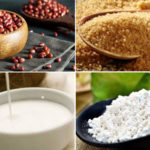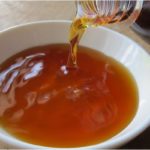Coconut milk, or sữa dừa in Vietnamese, is a popular ingredient often used in cooking, especially in stews, desserts, and baking. Have you heard of coconut milk before? If not, join us as we explore what it is, how to differentiate it from coconut cream, and the best ways to store it.
1 What is Coconut Milk?
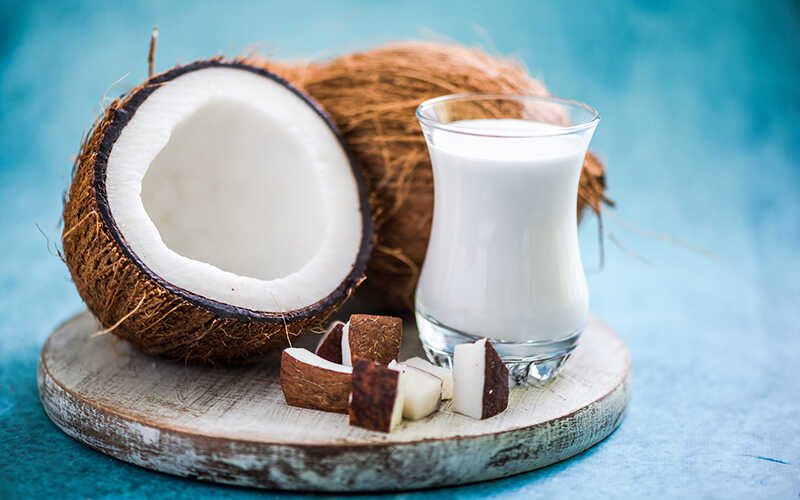 Coconut milk has a creamy white color and a rich, aromatic flavor.
Coconut milk has a creamy white color and a rich, aromatic flavor.
Coconut milk is a delicious, creamy white beverage with a rich, aromatic flavor extracted from coconuts. In culinary contexts, it is considered a vital ingredient in creating delectable treats such as desserts, cakes, and more.
It is produced by grating (or chopping/blending) coconut meat to extract the liquid, which is then mixed with water or coconut water through a few simple preparation steps.
2 Distinguishing Coconut Milk from Coconut Cream
Coconut milk can be categorized into four types based on its fat content (thickness):
- Coconut cream concentrate: Fat content of 29% and above.
- Coconut cream: Fat content ranging from 20% to 29%.
- Coconut milk: Fat content typically falls between 10% and 19%.
- Light coconut milk: The least thick variety, with a fat content of 5% to 9%.
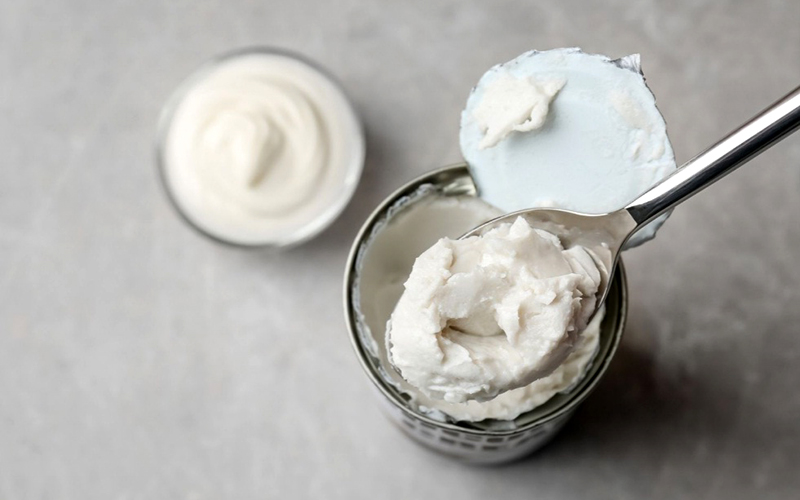 Coconut cream has a higher fat content and, therefore, a richer flavor than coconut milk.
Coconut cream has a higher fat content and, therefore, a richer flavor than coconut milk.
As a result, coconut cream can be considered a type of coconut milk, but due to its higher fat content, it has a richer, more indulgent flavor. It is commonly used in baking, ice cream making, and cooking when a sweet, fatty element is desired.
 Coconut milk can be used in beverage mixing.
Coconut milk can be used in beverage mixing.
On the other hand, coconut milk, which is the most commonly sold variety, is perfect for cooking, stewing, or directly incorporating into desserts and drinks due to its thinner consistency and moderate fat content.
3 Storing Coconut Milk
Coconut milk is a highly perishable food with a significant fat content, making it susceptible to bacterial contamination. Improper storage can lead to rapid spoilage. Here are three effective ways to store it:
Method 1: Refrigeration
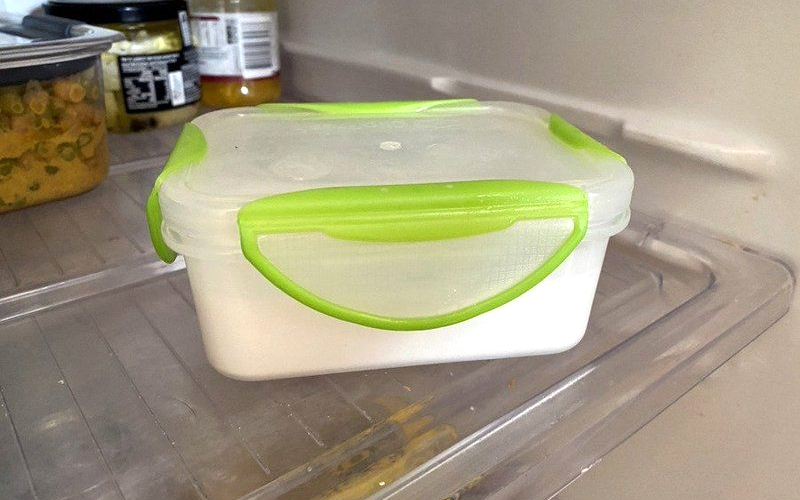 Refrigerated coconut milk can last up to a week.
Refrigerated coconut milk can last up to a week.
The best way to store coconut milk is to place it in an airtight container in the refrigerator, where it can last for up to a week. It is recommended to divide the milk into smaller portions so that you only need to remove what you need, leaving the rest undisturbed.
Method 2: Freezing
In addition to refrigeration, freezing coconut milk is an excellent option, extending its shelf life to approximately 5–6 weeks.
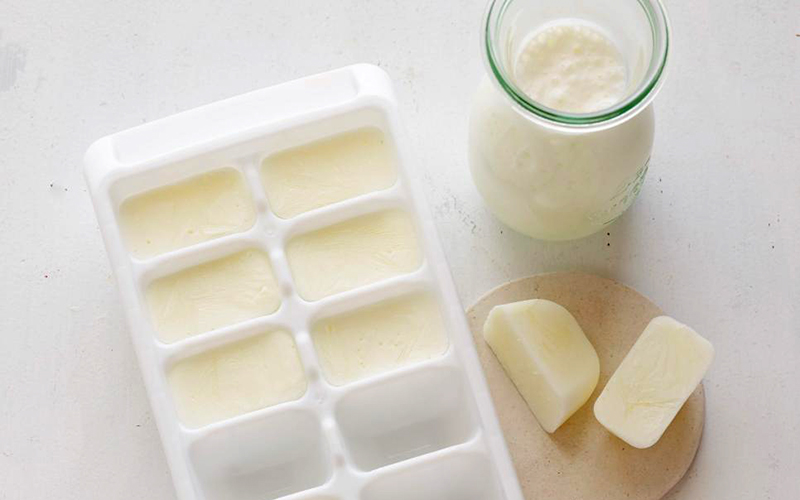 Frozen coconut milk can last for about 5–6 weeks.
Frozen coconut milk can last for about 5–6 weeks.
With this method, simply pour the milk into ice cube trays, cover them, and place them in the freezer. If your trays do not have covers, you can wrap them tightly in plastic wrap. When needed, take out a frozen cube and let it thaw before use.
Method 3: Using Canned or Powdered Coconut Milk
Opting for canned or powdered coconut milk is ideal if you’re looking for a more convenient and long-lasting option. These products typically have a shelf life of around 2–3 years, as indicated on the packaging.
 Canned or powdered coconut milk can be stored for approximately 2–3 years.
Canned or powdered coconut milk can be stored for approximately 2–3 years.
However, once you open a can of coconut milk, it’s best to use it within 7–10 days. As for powdered coconut milk, simply seal the unused portion airtight and store it in a cool, dry place. You can then mix the powder with water according to your requirements, following the provided instructions.
Some Important Notes on Storing Coconut Milk
Before using stored coconut milk, always inspect it carefully, as storage times are only approximate. If you notice any unusual odors or changes in color, it’s best to discard it.
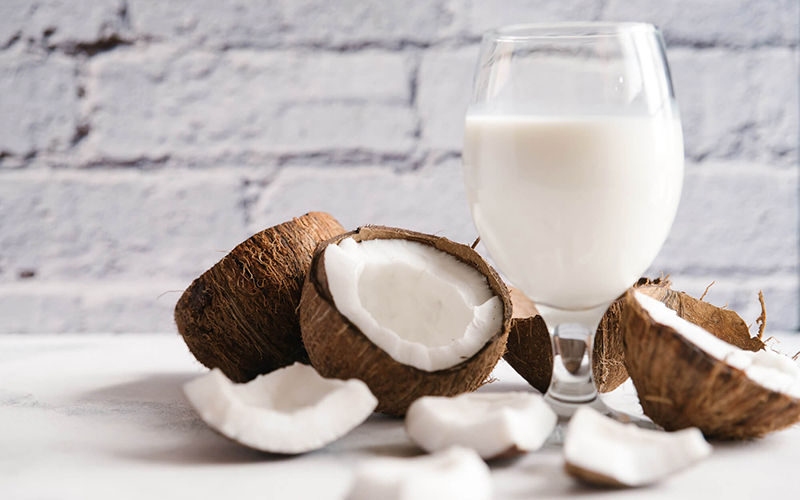 Avoid using coconut milk if it has an unusual odor or discolored appearance.
Avoid using coconut milk if it has an unusual odor or discolored appearance.
Additionally, the quality of coconut milk can be negatively impacted by power outages or fluctuations in your refrigerator’s temperature. To minimize waste and make it more convenient to use, store coconut milk in smaller portions.
4 Where to Buy Coconut Milk
As of May 2021, the price of coconut milk ranges from VND 17,000–20,000 per packet of powder and VND 25,000–40,000 per 400ml can.
 Coconut milk is available at local markets, supermarkets, our stores, and online retailers.
Coconut milk is available at local markets, supermarkets, our stores, and online retailers.
As a familiar ingredient to many home cooks, coconut milk can be easily found in local markets, supermarkets, our stores across the country, and various online retailers.
We hope that through this article, you now know what coconut milk is, how to differentiate it from coconut cream, and how to store it properly. If you’re planning to bake cakes, make desserts, or cook dishes that call for coconut milk, don’t hesitate to give it a try!
Exploring the Contrasts between Coconut Water and Coconut Milk
Are you curious about how to make the most of coconut water and coconut milk in your cooking? Join us as we explore the many ways to incorporate these two delicious ingredients into your meals!

























